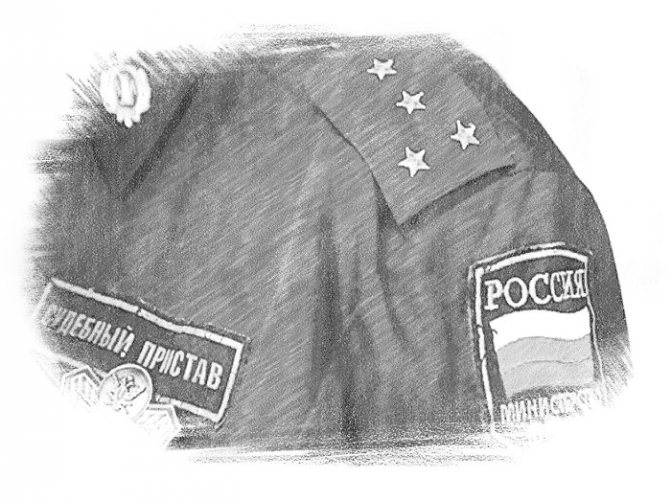From the point of view of the bailiff, the debtor is a citizen or organization against whom enforcement proceedings have been initiated for the forced recovery of funds or property, based on a decision of the judicial authorities. Every person may face a situation where a fine for violating traffic rules is not paid on time, child support is not paid, or interest on a bank loan is not paid. When the person obligated to pay the debt refuses to do so, the case goes to the FSSP. Finding yourself in such a difficult situation, a person is interested in how long the bailiffs owe the debt.
Writing off money is a procedure that worries all defaulters. According to the law, the FSSP does not have the right to repay the debt without a court decision, that is, the bailiffs will not be able to cancel it. If the borrower is unable to pay, he does not have property or work, then the enforcement proceedings against him can be stopped, but this is not their responsibility, but only the opportunity to receive relief.
Limitation period for debt
The period when an organization has the right to recover funds from a defaulter through the court is called the statute of limitations. The bailiff initiates enforcement proceedings on the basis of a written statement from the victim, then, within 6 days, a resolution is prepared, which is sent to the parties to the conflict.
For example, a citizen took money from a bank at interest and does not fulfill the obligations specified in the contract, then the organization takes the violator to court. The judge, having considered the application, has the right to decide on the forced withdrawal of funds from the borrower. The court decision is sent to the bailiffs, and the latter will try to extract money from the debt violator by all legal means.
Important
Having received the notice, the borrower is obliged to pay the lender within the prescribed period. According to Federal Law No. 229, the debtor is given 5 days from the date of receipt of the resolution to resolve the issue with the creditor.
Finding themselves in a difficult financial situation, debtors usually look for ways to cancel debts from bailiffs and play for time, hoping for the expiration of the procedural period. Such actions do not end well, since the creditor, based on the provisions of Article 208 of the Civil Code of the Russian Federation, has the right to extend the limit to an unlimited time if there are irregularities in the written agreement between him and the violator.
The time limit established by Russian legislation for going to court to collect a debt is three years, but this limit can be extended at the request of third parties or a creditor.
Statute of limitations on a loan - what is it?
The statute of limitations is the period of time during which the bank has the right to go to court to collect the debt from the debtor.
It starts counting from the day when the borrower first defaulted on his obligations, that is, did not make the monthly loan payment on time. The term and start date of the limitation period are regulated by Art. 200 Civil Code.
The statute of limitations lasts 3 years. If the bank did not file a claim in court, and the debtor did not make payments on the loan, and also did not contact bank representatives during this period of time, the loan debt is canceled.
So, the answer to the question of how long it takes for banks to write off loan debts is three years.
Attention! If you ignore communication with bank representatives, the credit institution will consider that you knowingly took out a loan with the intention of not repaying it and may bring charges of fraud against you.
Bad debt burning
Bad debt is associated with the inability of the debtor to pay the lender for one or another objective reason. Enforcement proceedings are suspended when:
- a certain limitation period has expired;
- the debtor is declared bankrupt, the organization is liquidated;
- there is no money or property to recover;
- the borrower is hiding and his whereabouts are unknown;
- the person obliged to return the money is in prison;
- the borrower died.
Before recognizing a debt as bad, government officials must take all measures to collect funds from the borrower, since debts from bailiffs are written off only if there are good reasons for doing so.
The death of the debtor is not always the reason for the non-repayment of the loan, because if the deceased has close relatives who are able to make payments, then the money is collected from them.
Removing debt from the FSSP after settlement with the creditor
Having paid the lender, the debtor must take into account how to write off debts from bailiffs. To exclude yourself from the list of defaulters, you must provide the FSSP with documents that can confirm payment of the debt:
- receipts, checks;
- a settlement agreement, if any, between the debtor and the creditor, in which both parties have reached an agreement regarding unpaid funds;
- passport;
Contact the Federal Bailiff Service at your place of residence. After the application and provision of the necessary papers, the official is obliged to terminate enforcement proceedings against the borrower, on the basis of part one of Federal Law No. 47.
After checking the information provided, FSSP employees issue a resolution to terminate the case, which will indicate the reasons for initiating enforcement proceedings, as well as provide facts confirming the fulfillment of obligations by the debtor.

After a decision has been made to terminate enforcement proceedings, FSSP employees are obliged to remove the debtor from the list of defaulters. After making the payment, borrowers are interested in only one question - how much debt is owed by the bailiffs, because even after full settlement with the lender, the borrower will be on the list of defaulters for some time, which causes inconvenience. When the bank accounts or property of the debtor are seized, the official is obliged to take measures to lift the restrictions within a specified period of time, not exceeding 7 working days.
Also, if a decree was issued against the debtor banning travel abroad, the bailiff must cancel such a document after fixing the calculation of the debt.
How to remove debt from the debtor database
How to remove information from the FSSP database about debt that has long been repaid? If a citizen has paid the debt and has confirmation of the transfer of funds, but continues to be listed as a debtor, you need to contact the bailiffs themselves.
applications for termination of enforcement proceedings free of charge in word format
You should visit the unit that handled the case. Finding it is not difficult, taking into account the territorial jurisdiction according to the place of registration of the citizen.
You must have with you:
- ID card (passport),
- a copy of the resolution on the completion of the enforcement proceedings initiated against this debtor.
It is necessary to submit a written appeal addressed to the head of this department. The letter can be in the form of a complaint or statement. The law does not oblige you to follow a specific form or use a form in this case.
The main thing that should be indicated is that the debt has been repaid (with reference to supporting documents), and information about its existence should be removed from the site.
It is necessary to set out all the important circumstances for the case. Be sure to provide your personal information, exact address and contact telephone number. Applications of this kind are considered within 10 days.
The document is written in two identical copies. One is transferred to the office or secretariat, the second remains with the applicant, and the FSSP employee puts a mark of acceptance on it.
If a citizen is registered on the website of the bailiff service, he can submit a similar application using the personal account system.
Watch the video. How to find out debt from bailiffs:
Cancellation procedure
Cases when a creditor has to seek forced collection of a debt from a borrower through the court are not uncommon. Often, unscrupulous citizens take out a loan from a bank or borrow money from friends against a receipt, but are in no hurry to return the funds. It is in such situations that the injured party has to restore justice by turning to the law. The court's decision to recover money is a document that is subsequently handed over to the bailiffs in court.
After the court makes a decision, the FSSP makes a decision on the forced collection of funds from the borrower. Here the question arises: “Are bailiffs’ debts written off?” Under a certain set of circumstances, measures taken to force a person to return money to the creditor are terminated on the following grounds:
- issuance by a judge of an order to cancel the enforcement proceedings - if the decision was made with violations, the court has the authority to suspend the enforcement proceedings;
- the lender personally requests to stop the forced collection of funds from the debtor;
- conclusion of a peace agreement between the parties to the conflict - the debtor promises in writing to the lender to pay the entire amount or part of the funds on a new date, or offers a mutually beneficial deal;
- The court ruled that the creditor's claims were unlawful.

Almost a third of enforcement disputes involve failure to pay child support. Article 120 of the Family Code clearly states the circumstances under which funds cannot be collected from the debtor. A common situation is when the parents are divorced and the father pays the mother money monthly for the needs of the children, but if the woman remarried and the children were adopted by the stepfather, then the legal father has the right to stop paying alimony.
How to write off debts from bailiffs
The main way to do this is to pay off your existing debt in full. This can be done with a one-time payment or in installments, in several installments (to do this, write a preliminary application to the contractor).
Another way is to sign a settlement agreement with the creditor, under which the amount of the debt will be significantly reduced or completely written off. This is possible for alimony payments for a minor child if you transfer expensive property (real estate) into his ownership.
The third way is to initiate bankruptcy proceedings and obtain debt write-off in case of insolvency. In this case, you will need to write an application to the arbitration court, a financial manager will be appointed who will take measures to satisfy the interests of creditors.
The procedure for carrying out the write-off procedure
If you want to close your debt to the bailiffs by paying off your obligations, the money is transferred to a special account of the territorial division of the FSSP. After the court decision enters into legal force, the writ of execution is transferred to the claimant and transferred to the bailiff. Within three days after receiving it, the representative issues a resolution to begin enforcement proceedings. Its photocopies are sent to the parties by registered mail.
Filing an application for the expiration of the limitation period to the FSSP
Although the creditor is given three years to apply with a court order to the FSSP in order to oblige the debtor to pay the debt, this period may not be enough to return the funds.
When the statute of limitations for enforcement proceedings has expired, the lender will have to go back to the judge with a petition in which he must indicate the reasons for the delay. The judge will consider the application and make a decision to extend the time for forced collection of money from the borrower; this document is then submitted to the FSSP. Next, the bailiffs make a decision on the forced collection of funds according to the usual scheme. Restoring procedural deadlines for recovering money from a debtor is a complex and energy-consuming matter.
If the statute of limitations expires, the creditor will practically lose the legal opportunity to collect money from the debtor. True, the law allows the bank to suspend the established limitation period for a certain time, on the following grounds:
- the plaintiff serves in the army, participates in the war;
- the presence of a deferment for the defendant;
- events occurred that did not depend on the will of people - earthquakes, floods and other accidents;
- a third party intervened in the dispute to help resolve the conflict;
- The Federal Law on enforcement proceedings or other legal act regulating the relationship between the borrower and the lender has changed and been repealed.
If you are not sure that it will be possible to collect the debt from the borrower within the established period, it is better to suspend the statute of limitations for enforcement proceedings by turning to the court in a timely manner.
This is interesting
The borrower has the right to appeal the court decision to restore the payment time within 30 days from the date of receipt of the notice. Thus, the dispute between the creditor and the individual will drag on for a long time.
Debtors should take into account that the statute of limitations for enforcement proceedings with bailiffs does not affect:
- disputes regarding the collection of material resources;
- compensation for damage to health as a result of an accident under the act of traffic police officers;
- private property rights;
- investing money in enterprises under credit conditions;
- compensation for damages to the victim as a result of severe bodily injury from the actions of the defendant.
The statute of limitations does not apply to the listed circumstances in accordance with the provisions of Article 208 of the Civil Code.
On what basis are they charged?
The procedure in accordance with which all performers act is determined by Law No. 229-FZ. The paperwork begins in connection with the claimant's application. In administrative and criminal cases, opinions are sent by a court or other body. If you give an example of a fine that was issued to a motorist for violating traffic rules, they will not immediately begin to demand:
- The decision can be appealed within 10 days;
- if there is a complaint, then after its full consideration;
- for a person to have time to do everything voluntarily, there are 60 days;
- if at this time he did nothing, then the decision is sent to the bailiffs;
- an FSSP employee initiates a case, notifies the debtor about this, and gives him 5 days to pay the debts;
- if in this case he fails, then 7% will be added to his payment.
Is it necessary to pay a valid enforcement fee - if the violator manages to do as the law requires of him, then there will be no reason for his demand. The plaintiff can go to the FSSP only when the conclusion has already become legal. To submit documentation, he must have the following documents in his hands:
- court order;
- an order from the magistrate, if this is a penalty, there is no point in discussing (when the employer owes wages or the ex-spouse alimony);
- sentence, if the convicted person is obliged to pay a fine, compensate for moral or physical harm, or pay costs;
- results of the administrative case.
Read Bailiff, who is it and what does it do: FSSP in simple words
You can obtain all these papers from the office. All documentation is issued with the seal of the relevant authority and signature. No differences are allowed between the decision and the writ of execution; both require the same list of requirements for the accused. It must be clear how much to pay the offender and why. For example, if a case was heard about reinstatement at work, then at the same time the following instructions may be presented:
- reinstate the employee in his previous position;
- pay him money for forced absences;
- demand compensation from him for possible moral damage;
- force you to pay for a lawyer.
Anything that does not involve money will need to be completed on the same day. 5 days are allotted for payment for voluntary compliance with the appointments.
Consequences of cessation of production
The collection period for bailiffs is counted from the moment of the first delay. Since then, borrowers have faced a number of inconveniences:
- the telephone number will constantly receive calls from FSSP employees demanding payment of the debt;
- if the debtor is officially employed, they will withhold 50% of the salary, so it is better to find an unofficial job;
- seize bank accounts by court order;
- the defaulter's property will be seized.

After the termination of enforcement proceedings, the bailiff is obliged to document all restrictions of a compulsory nature imposed on the debtor. If a week has passed since the debt was repaid and the bailiff did not assist in lifting the seizure from the debtor’s bank account, and the latter’s car or other property is still under arrest, it is worth contacting a higher authority, for example, complaining to the prosecutor about the unlawful actions of an FSSP employee.
According to Federal Law 229, copies of the official’s decision are sent to the court, the creditor and the person who withheld the payment of funds. The lender does not have the right to re-apply to the court with a claim for debt collection on the same grounds if the enforcement proceedings have been terminated.
Even after the statute of limitations has expired, the bailiffs have the right to demand recovery of funds from the defaulter, but in practice, lenders often forgive the borrower. When the amount is small, the statute of limitations has expired, the debtor has died and there are no solvent heirs left - it is in such situations that the lender has to come to terms and forgive the debt.
About ways to check paid invoices
It is possible to check whether bailiffs’ debts have been burned after repayment in the following ways:
- go online to the official website of the FSSP and request the necessary information;
- call or personally visit the bailiff service;
- make a request on the State Services portal.

The necessary information on fines and debts is also available on social networks and mobile applications. The debtor, having received information about the outstanding debt, must pay the creditor in a timely manner, or if he considers himself right, apply to the court and challenge it.









